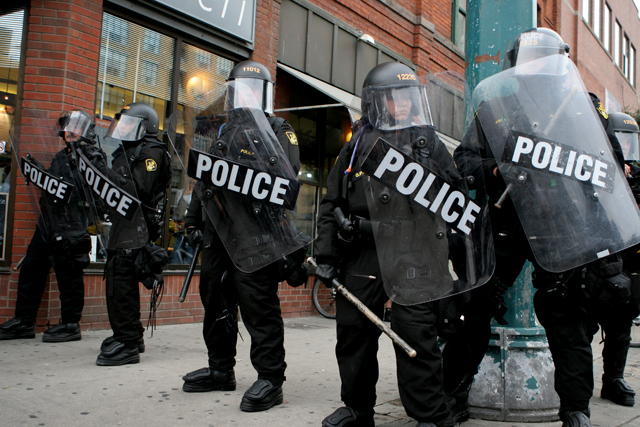Two G20 class-action lawsuits will go ahead, Ontario’s Court of Appeal ruled on Wednesday.
Both lawsuits refer to the “kettling” of protesters during the June 26-28, 2010 summit.
“We were illegally arrested, thrown into overcrowded wire cages, and treated worse than animals in a zoo,” Tommy Taylor, a lead plaintiff in the lawsuits, said in a statement Wednesday.
“We want justice to be served. We don’t want this to happen to any other Canadian, ever again.”
On Saturday, June 26, a small group of vandals smashed windows and set police cruisers on fire. Police boxed in protesters in front of the Novotel hotel on The Esplanade. More than 260 people were arrested and taken to a makeshift processing centre, which came under severe criticism for its deplorable conditions.
The second incident occurred the next day, at Queen Street West and Spadina Avenue. Hundreds of people were boxed in and prevented from leaving, despite a severe thunderstorm that left them drenched.
In its decision, the Court of Appeal said “the remedies sought by the plaintiffs, which include a declaration that class members’ charter rights have been violated and an award of damages, would be stronger instruments of behaviour modification” than previous, non-binding decisions.
Lawyers involved in the lawsuits said the class actions cover over 1,000 people whose civil rights have been violated. The lawsuit is seeking $75 million in total damages ($35 million in general damages, $20 million in special damages and $20 million in punitive damages.)
The lawsuit will also be seeking court declarations regarding the rights and interests of the proposed class including Charter rights.
Police authorities in Toronto had wanted the Appeal Court to quash the class proceedings, which had already been subject to two lower court rulings. The courts had originally ruled against certifying a class action, but Divisional Court overturned the ruling on initial appeal and instead split the action in two.
“The police cannot justify the detention of a person based on information that they either did or not have, or which they did not rely upon, in ordering a person to be detained,” the Court of Appeal said Wednesday.
“In other words,” lawyers involved in the lawsuit said, “police cannot arrest an entire group of people as a way of ‘fishing’ for particular individuals.”
Sherry Good, the other lead plaintiff in the lawsuit, said she was “delighted” by the decision.
“Now the police need to make changes and prove to us that this will never happen again,” Good said in a statement.
The lawsuit names the Toronto Police Services Board, the Attorney General of Canada, Her Majesty The Queen in right of Ontario, and the Regional Municipality of Peel Police Services Board.
“The Toronto Police Services Board acknowledges the decision of the Ontario Court of Appeal today,” Andy Pringle, Chair of the Toronto Police Services Board said in a statement. “As the decision has just been released, the Board will be reviewing it and considering its options, taking advice from its counsel. We are committed to continuing to participate in this legal process as it moves forward.”
Lawyer Eric Gillespie said a class action could “help protect the basic freedoms of all Canadians” while co-counsel Kent Elson said it could lead to the disclosure of confidential police documents and tapes about what really happened as well as “positive reforms about policing.”
The Court of Appeal also awarded the plaintiffs $315,000 in costs for the certification motion and another $65,000 for the appeal.
Read the entire article on the source link below.
Source: www.citynews.ca




